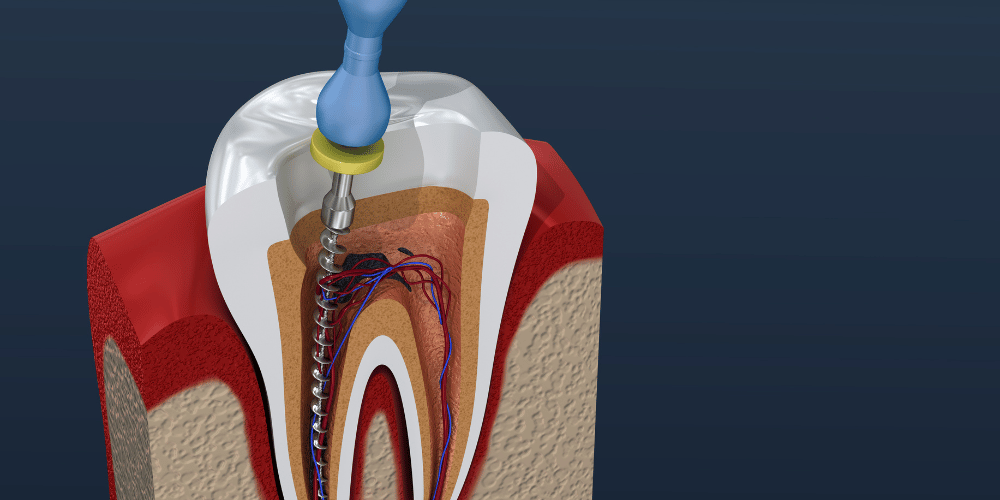Root canals are a fairly routine procedure for dentists, but that doesn’t mean it always goes as planned. Root canals can fail for a variety of reasons, and when they do the patient is often left in pain and with an unexpected bill. So what should happen when a root canal fails, who is responsible for the costs, and how should these issues be addressed? This blog post will explore these questions in order to provide some clarity on this complex subject. We will look at different scenarios, explain who should pay for failed root canals, and consider potential solutions.
What is a root canal?
A root canal is a dental procedure that involves removing the damaged or infected pulp from the tooth and sealing it to prevent further damage. The pulp is the soft tissue in the center of the tooth that contains blood vessels, nerves, and connective tissue.

Why do root canals fail?
There are many reasons why root canals may fail. The most common reason is due to inadequate cleaning and shaping of the root canal system. If the root canal system is not thoroughly cleaned and shaped, bacteria and other debris can remain present and will eventually lead to reinfection of the tooth. Other reasons for root canal failure include:
-poor quality dental materials used during the procedure
-inadequate sealing of the root canal
-cracks or fractures in the tooth that were not detected during the procedure
If you have had a root canal that has failed, it is important to seek treatment from an experienced endodontist as soon as possible. They will be able to determine the cause of the failure and develop a treatment plan to save your tooth.
Who is responsible when a root canal fails?
When a root canal fails, it is typically the responsibility of the dentist who performed the procedure. This is because root canals are considered to be a relatively routine and straightforward procedure, and as such, dentists are expected to have a high success rate. In some cases, however, there may be extenuating circumstances that contribute to the failure of a root canal (e.g., severe tooth decay or an unusually shaped root canal). In these cases, it may be difficult to determine who is responsible for the failed root canal.
How much does it cost to fix a failed root canal?
The cost of fixing a failed root canal can vary depending on the extent of the damage and whether or not you have dental insurance. If the damage is minor, your dentist may be able to simply re-treat the tooth. More extensive damage may require a referral to an endodontist (a specialist in treating teeth) for surgery to repair the damage. Without dental insurance, you can expect to pay anywhere from $600 to $1,500 for the procedure.
What are the risks of a root canal?
There are several risks associated with root canals, including:
1. Infection: If the root canal is not performed properly, the tooth can become infected. This can lead to pain, swelling, and eventually, an abscess.
2. Nerve damage: The nerve of the tooth can be damaged during a root canal. This can lead to pain, numbness, or tingling in the affected area.
3. Bleeding: There is a small risk of bleeding during a root canal procedure.
4. Allergic reactions: Some people may have an allergic reaction to the materials used during a root canal, such as latex gloves or local anesthesia.
Why do some dentists think they should pay for failed root canals?
There are a number of reasons why some dentists think they should pay for failed root canals. First, root canals are often very expensive procedures, and if a dentist is responsible for a failed root canal, it may be difficult or impossible for the patient to afford another procedure. Second, root canals can be very painful, and if a dentist is responsible for a failed root canal, the patient may suffer unnecessary pain and suffering. Third,root canals can cause serious health problems if they are not performed properly, and if a dentist is responsible for a failed root canal, the patient may be at risk for these health problems. Finally,root canals can be very difficult to perform, and if a dentist is responsible for a failed root canal, it may reflect poorly on the dentist’s skills and training.
What are the alternatives to a root canal?
There are a few alternatives to a root canal, but they are not always successful. One alternative is to simply remove the tooth. This is not always an option, however, as it can lead to further problems down the road. Another alternative is to fill the tooth with a material that will prevent bacteria from growing. This can be effective, but it is not always permanent.
Should the dentist pay for a failed root canal?
There is much debate on whether or not the dentist should be held financially responsible for a failed root canal. Many people believe that the dentist should indeed pay for a failed root canal, as it is their professional duty to ensure that the procedure is carried out correctly. Others believe that the patient should be responsible for any costs associated with a failed root canal, as it is ultimately their decision to undergo the treatment in the first place.
There are a few key points to consider when making this decision. Firstly, it is important to consider who will be paying for the re-treatment if the initial root canal fails. If the patient is responsible for the costs, this may deter them from seeking necessary treatment in future, as they may fear another financial burden. Secondly, it is worth considering what caused the initial root canal to fail. If it was due to negligence on the part of the dentist, then it stands to reason that they should be held financially responsible. However, if the failure was due to an unforeseen complication, such as an infection, then it may be unfair to penalise the dentist.
Ultimately, there is no right or wrong answer when it comes to deciding who should pay for a failed root canal. It is a decision that must be made on a case-by-case basis, taking into account all of the relevant factors.
Who should pay for a failed root canal?
If you have a failed root canal, it is important to determine who should pay for the treatment. In some cases, your insurance company may cover the cost of the procedure. However, if your insurance does not cover the cost of a failed root canal, you may be responsible for paying the entire cost of the procedure. If you are unsure who should pay for your failed root canal, it is best to consult with your dentist or an experienced medical billing specialist.

How to prevent a failed root canal
There are a few things you can do to help prevent a failed root canal. First, be sure to schedule regular dental appointments so that your dentist can keep an eye on the health of your teeth and identify any potential problems early on. Secondly, brush and floss regularly to remove plaque and bacteria from your teeth and gums. Finally, avoid eating hard or sticky foods that could damage your teeth. If you do experience a toothache or other symptoms of a potential problem, be sure to see your dentist right away.
Conclusion
Ultimately, it’s up to the patient and dentist to decide whether or not they should pay for a failed root canal. Although there are certain circumstances when insurance companies may cover the cost of a second treatment, it is important that patients and dentists understand their individual policies in order to make an informed decision about who will be ultimately responsible for the expenses associated with this procedure. In any case, we hope that our article has helped you better understand your rights as a patient when dealing with this issue.










Leave a Reply